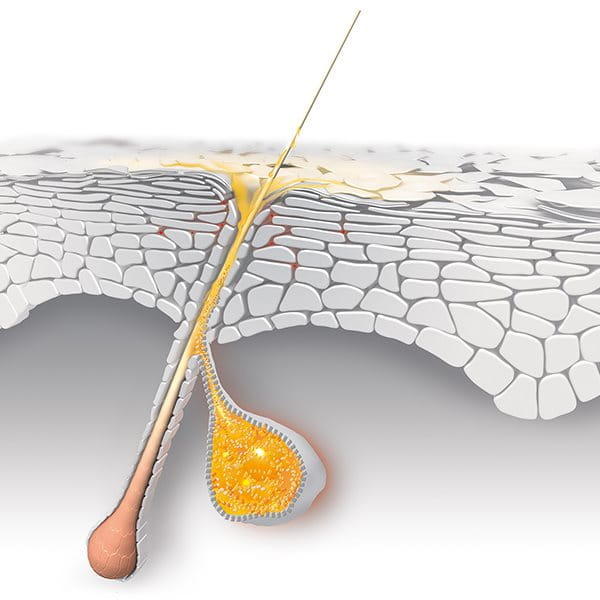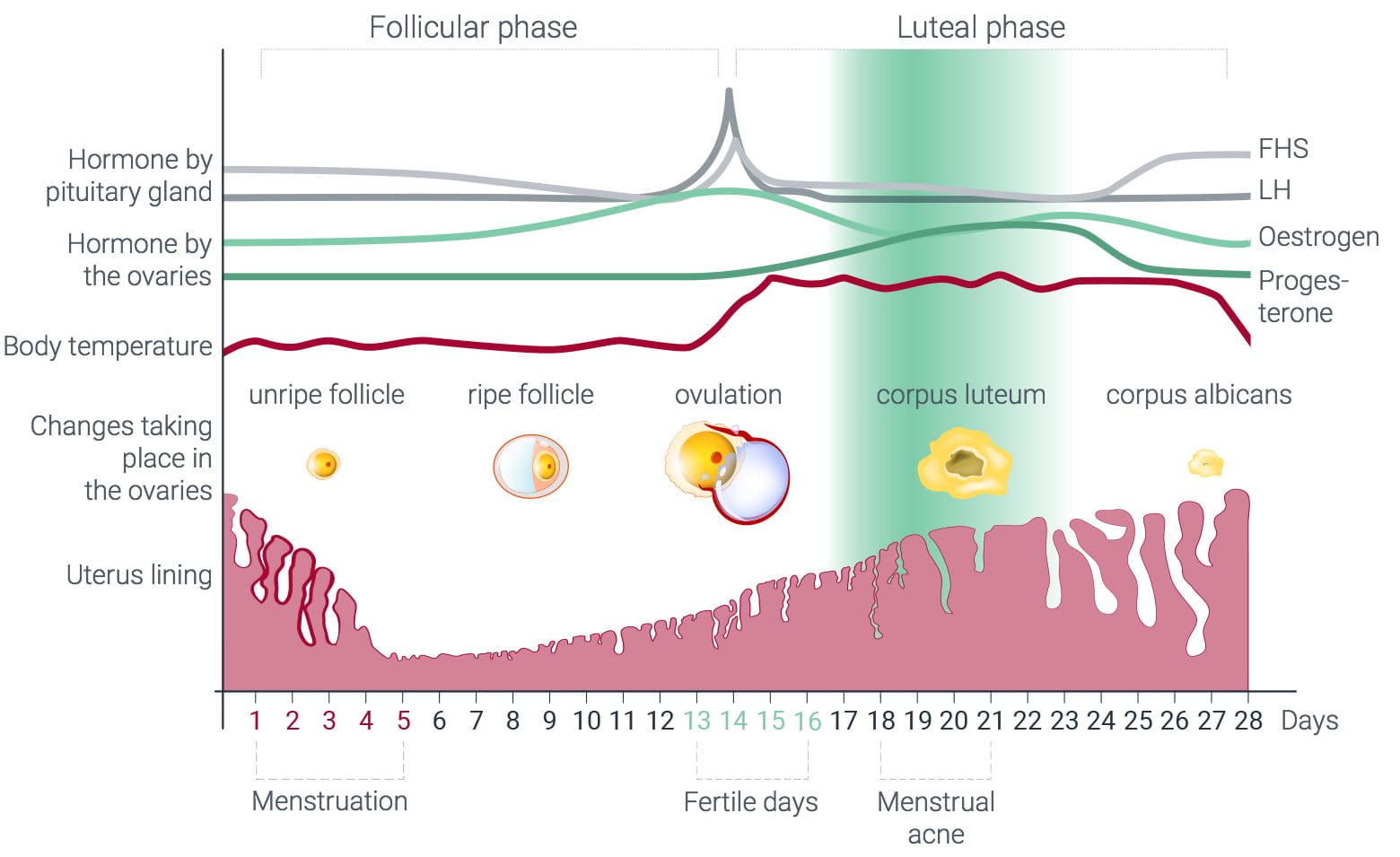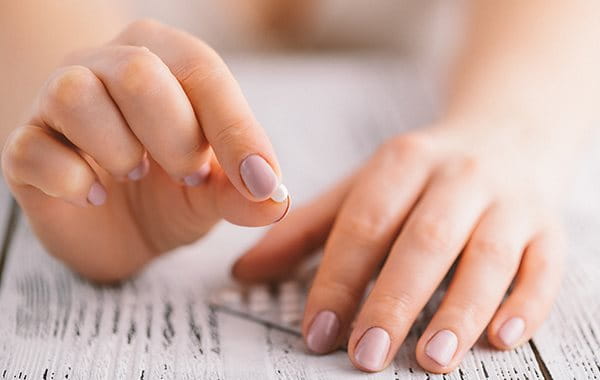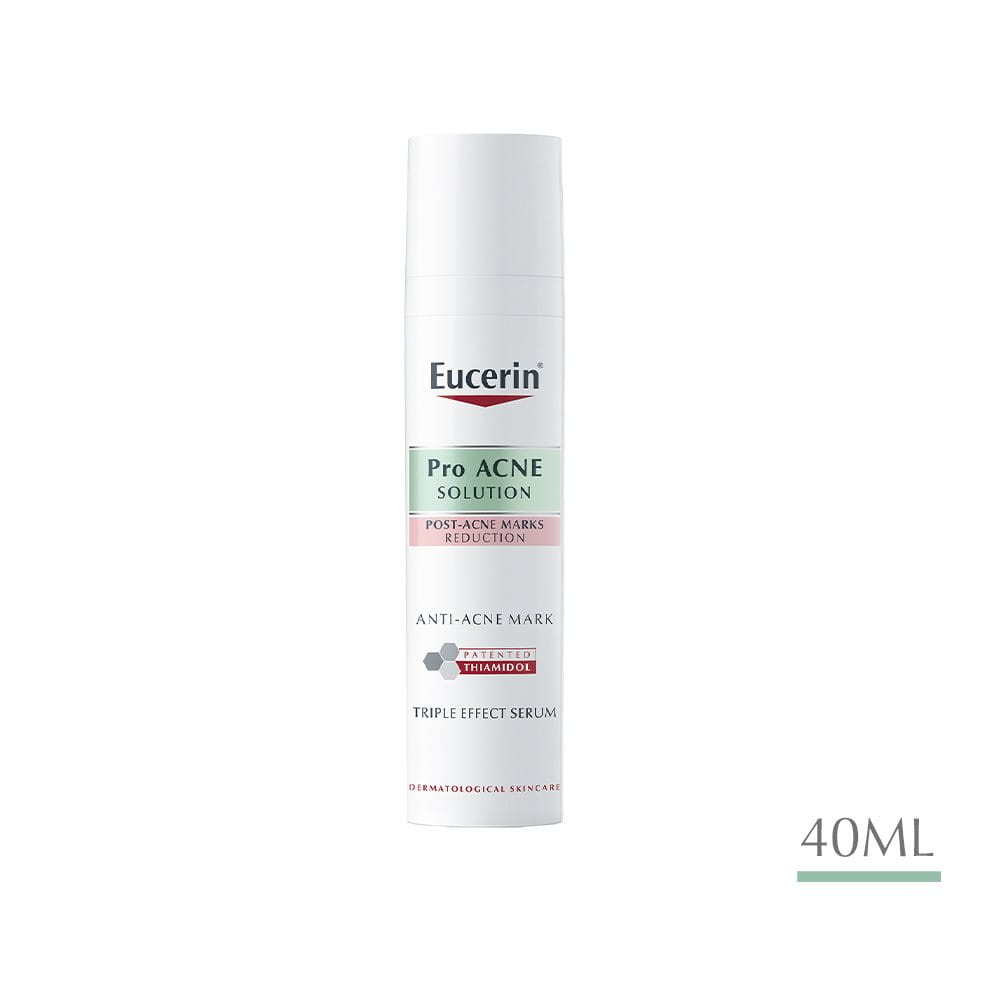If you’re a woman, then you’ll be familiar with the way that blemishes suddenly appear shortly before and during your periods. Even if your skin is normally clear. Why is that?
Our hormones are one of the major causes of acne − for adults as well as for teenagers. This article looks at the link between acne and hormones and explains why they effect women in particular. It examines how fluctuations in hormonal levels during the menstrual cycle, pregnancy and the menopause can cause acne.
How are acne and hormones linked?
We don’t know exactly how hormones affect acne but we know that they are closely linked.

There are many different causes linked to acne but it is a hormonal disease. Hormones are responsible for the development of our sebaceous glands and it’s only when they mature, during puberty, that we get acne. During puberty our bodies produce an excess of male hormones (androgens) which stimulate the production of sebum in the sebaceous glands and the overproduction of sebum (known as seborrhea) is one of the symptoms that can lead to acne.
Find out more in the causes and triggers of acne.
How hormones, and acne, affect men and women differently

During puberty, levels of testosterone (a male sex hormone) rise in both men and women.
In men, this results in the growth of the penis and testicles. In women it increases muscle and bone strength. Testosterone also causes acne which is why it is so prevalent during teenage years. Up to 70 % of all young people have to deal with problem skin prone to acne during puberty1
In most cases, the acne improves significantly after puberty. Nevertheless, up to 40% of all adults (from 25 years old) are affected by acne at least occasionally *1 The surprising thing is that 75 – 85 % of these are women.
This is where the differences begin. While, for men, hormones stabilize over the years, they continue to fluctuate in women. Between the ages of 20 and 40 in particular, and then again during the menopause, women are particularly prone to hormonally triggered acne. There are three factors behind this:
- The menstrual cycle
- Pregnancy
- The menopause
1 - Zouboulis, Hautarzt 2014 · 65:733–750.
2 - Zeichner et al., J Clin Aesthet Dermatolog., 2017; 10 (1): 37-46 and Holzmann, Sharkery, Skin Pharmacol Physiol 2014; 27: 3-8
Hormonal acne and the menstrual cycle
According to a dermatological study, more than 60% of all women affected by acne experience regular premenstrual worsening of their symptoms.
This is because the female menstrual cycle causes hormone levels to rise and fall and skin is affected differently at different times of the month.

The menstrual cycle usually lasts for 28 days (it begins with the first day of a period and ends one day before bleeding begins again) and each day is different hormonally:
- Day 1 to 14
Two hormones released by the pituitary gland − Follicle Stimulating Hormone (FSH) and Luteinizing Hormone (LH) − control the function of the ovaries and their hormone production. At this point, oestrogen (a hormone which promotes female characteristics) is dominant over progesterone (a hormone which helps prepare the female body for conception and pregnancy).
- Day 14 to 28
Progesterone levels rise and it becomes the dominant hormone. Significantly for skin, this rise stimulates sebum production. Oestrogen levels drop.
Shortly before bleeding begins, both oestrogen and progesterone are at their lowest levels. At this point testosterone (which is always present in women though in lower amounts than in men) is actually at a higher level than the female hormones, causing even more sebum production.
Premenstrual acne usually flares up between seven and ten days before a period – i.e. around days 18 to 21. During the period itself, the condition of the skin generally improves.
3 - http://www.webmd.com/skin-problems-and-treatments/acne/features/period#1
Acne during pregnancy

Pregnancy is another time when hormones fluctuate and women experience higher levels of androgens (male hormones) which can trigger acne.
More than half of pregnant women suffer from acne problems during pregnancy, at least from time to time.4 Those who are already prone to acne are the most likely to experience it during pregnancy, although some women who have never had acne before get it for the first time4.
Hormone levels are at their highest during the first trimester (the first three months of pregnancy) and some sources suggest that if you don’t experience any unusual breakouts during the first three months then you are unlikely to during the rest of your pregnancy (though there is no conclusive evidence to back this up). In fact, pregnancy acne can break out for the first time at any stage of a pregnancy and/or after the birth.
On the other hand, some women with blemish -prone skin also report that their skin clears up during pregnancy.
Talk to your doctor if you have any questions
The gynecologist taking care of you during your pregnancy will be able to advice you on any skin concerns you may have or recommend a dermatologist. It’s important that you consult your doctor before taking any medication or changing your diet in any way. A developing foetus needs a healthy, balanced diet and certain acne medications, such as Isotretinoin (a drug used to treat severe acne), must not be taken during pregnancy as it can harm your unborn child.
4 - http://www.webmd.com/skin-problems-and-treatments/acne/acne-during-pregnancy-treatments-causes#3
Acne and the menopause
Many women report skin problems as they enter the menopause: dryness, rashes, increased sensitivity and even blemishes and pimples. As with the menstrual cycle and pregnancy, some of these problems can also be due to hormone fluctuations.
When the menopause begins, a woman’s body undergoes profound changes. The hormones oestrogen and progesterone are produced in ever smaller quantities and this can cause a variety of symptoms including: hot flushes, irregular menstrual cycles and skin problems.
Skin cells lose their ability to store moisture over time, and skin takes longer to renew itself and heal. It becomes thinner and less elastic and, as a result, becomes more sensitive, dry and susceptible to blemishes.
What can I do to help keep my hormones, and acne, under control?

- Get professional advice.
If you experience acne consult your doctor who will advise you on the best treatment options for your skin. They may recommend that you talk to an endocrinologist (a hormone specialist) or to a gynecologist (a specialist in the female reproductive system).
Some women find that the contraceptive pill can help with menstrual acne. It does so by producing a protein called Sex-Hormone Binding Globulin (SHBG) which sponges up the testosterone thereby raising oestrogen levels in the blood.
If you are pregnant, or planning to get pregnant, you should avoid all acne medication and ask your doctor or gynecologist for alternative recommendations. Acne medication contains chemicals that are dangerous for a developing baby.
For men, there are medical options available that help to keep testosterone levels, and acne, under control and your doctor will be able to advice on which are most suitable for you.
- Look after yourself.
Exercise and a healthy, balanced diet will help you to keep your body in good shape (and to help you feel more in control too). A diet rich in phytoestrogens (natural, plant-based hormones found in soya beans and other legumes) may also help you to keep you hormones in balance.
- Take care of your skin.
A regular skincare routine, using non-comedogenic products specially formulated for blemish-prone skin, will help you to keep your skin healthy and complement any medication you may choose to take.
- Try not to get stressed.
Easier said than done we know, but stress can trigger your sebaceous glands and make acne worse. Find out more in What causes or triggers acne.




